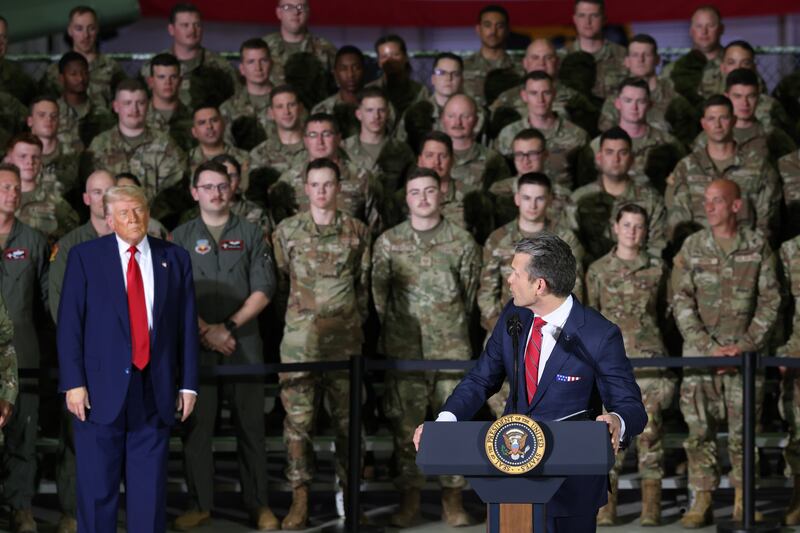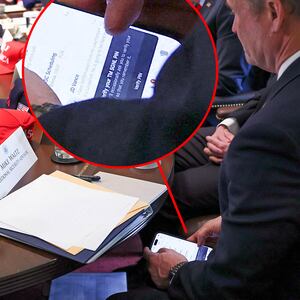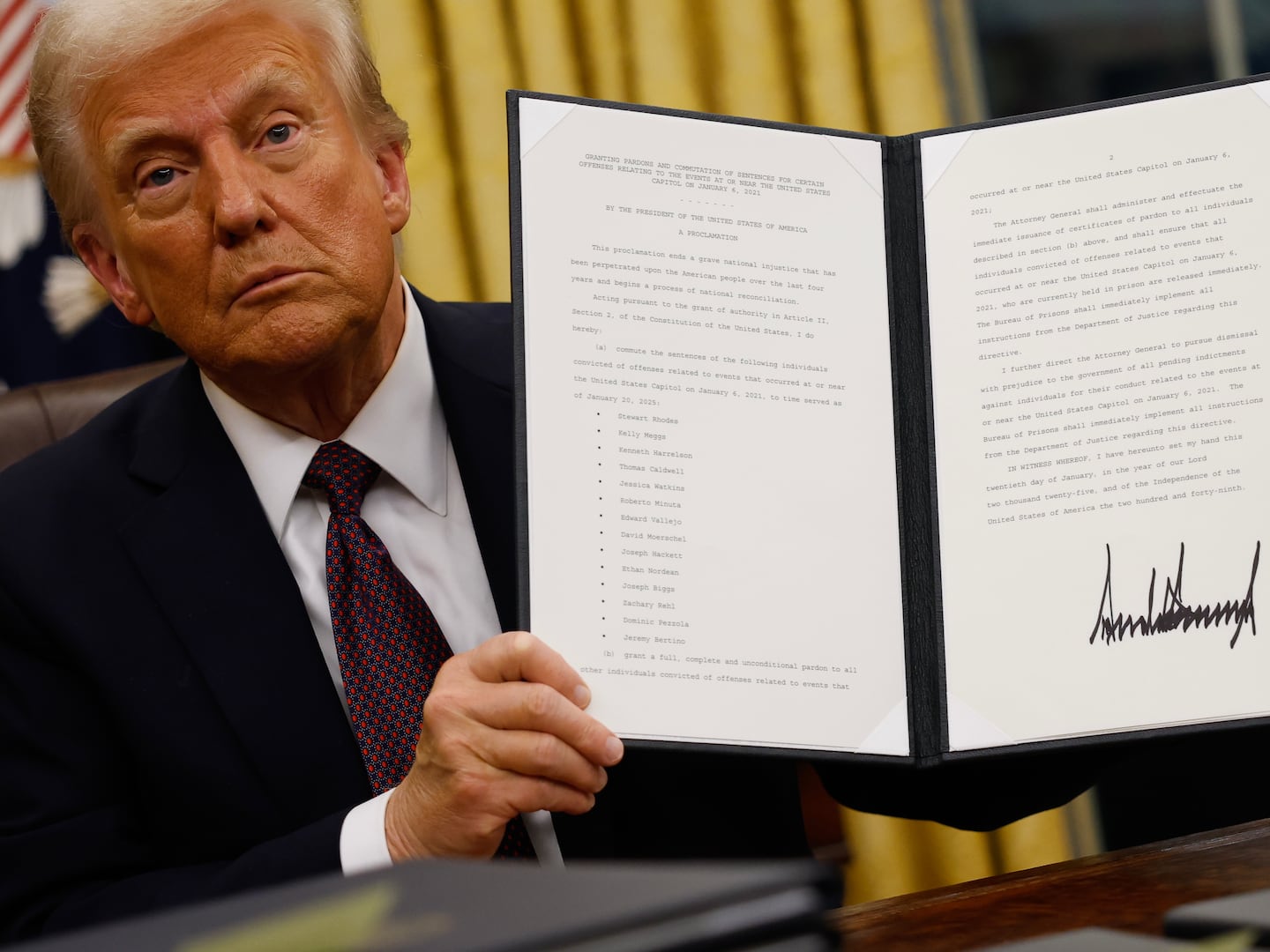President Donald Trump‘s decision to move Mike Waltz from his position as National Security Advisor to a plum gig as U.N. Ambassador may seek to bring an end to some elements of the ongoing ‘Signalgate’ controversy. But at the Department of Defense, the episode could still cause major headaches—if not heads to roll entirely.
In short, the Defense Department’s acting Inspector General Steve Stebbins, a career civil servant, has announced that his office will conduct an evaluation into the use of a messaging app (presumably Signal) by DOD personnel, including Defense Secretary Pete Hegseth—the review appears to include the messages in which sensitive information regarding upcoming strikes against Houthi rebels were shared with a journalist, as well as messages between Hegseth and his family that included similar military information.
Not only should this review address the specific security issues—and potentially identify breaches—surrounding the use of Signal for sensitive communications, but it will likely tee up a more pressing issue: whether the Trump administration will allow fair, objective and independent oversight into its activities.
ADVERTISEMENT
This is a crucial question that should raise alarm bells for all Americans, especially in light of the President’s firing of 18 Inspectors General (myself included) at the start of his term.
As a threshold matter, the review is exactly what’s needed. Inspectors General are built for this very type of review, because they are independent and have no dog in the proverbial fight. They have no incentive to find a particular answer, be it exoneration or inculpation. Moreover, the Office of Inspector General (OIG) is staffed with professional evaluators governed by rigorous standards—and whose work is regularly reviewed by outside professionals.
An Inspector General’s jurisdiction is limited to its agency’s programs and operations, meaning this review will address only the Department of Defense and its officials. And yes, the OIG could face pressure from the department—government agencies behave like that often. But I hope, and expect, this will have little to no impact on the process, which will be fair and transparent.
Congress and the American public can trust the results. In a matter as high-profile and sensitive as this, this independent assessment is exactly what’s needed.
It’s important to note that the OIG is initiating an evaluation, not an investigation. Those are very different things in the Inspector General world—and they yield different results, which it’s important to match expectations against.
In general terms, an investigation examines specific incidents to determine whether individuals violated a law, rule or policy. It is conducted by federal special agents or other investigators who gather evidence to determine whether misconduct occurred. If they uncover evidence of criminal activity, they are obligated to refer the matter to the Justice Department for potential prosecution.
In contrast, evaluations focus on a program’s efficiency and compliance with laws, rules and policies—in this case DoD’s use of a commercially available messaging app. If the evaluation identifies systematic failings, such as inadequate documentation, inconsistent implementation or misapplication of relevant rules, it will provide recommendations to the agency. Think of it as more like an audit. (To be sure, if an Inspector General obtains evidence during an evaluation suggesting that criminal or administrative misconduct may have occurred, it will refer the matter to its investigators or the Department of Justice for development. But that is generally not the objective.)
Evaluations can still be hard-hitting and identify serious problems with material recommendations for corrective actions. What the IG uncovers might well be embarrassing for Hegseth or others at DoD. But Americans should not expect a scandalous, soap-opera narrative like some IG investigative reports.

Here’s the big wrinkle: whether the Inspector General has unfettered access to all relevant materials. In general terms, an Inspector General is authorized to obtain all relevant materials of the agency as they conduct their oversight. But the relevant statute has specific provisions for the Department of Defense that allow the Secretary of Defense to stop such a review or the obtaining of such materials “if the Secretary determines that such prohibition is necessary to preserve the national security interests of the United States.” No Secretary of Defense has asserted this authority in recent memory, if ever.
So this is the key question Americans should be asking: Will the Secretary of Defense invoke these provisions to shut down the OIG’s evaluation? To do so would be an unprecedented step—and one Hegseth would subsequently have to justify publicly. But even if Hegseth doesn’t shut down the review entirely, will the Inspector General obtain access to all relevant documents, including classified materials? Will they have the opportunity to interview all relevant witnesses—and those witnesses be free to talk without fear of retaliation?
And crucially, will they feel free to issue their report, regardless of the findings, without fear of retaliation? I know the acting IG a bit from my tenure as Chair of the Council of Inspectors General—he is a straight shooter, and exactly the type of sober, fair leader needed for this sensitive review. But Trump fired former USAID IG Paul Martin, a fair-minded stalwart in the IG community, less than 24 hours after his office issued a report with negative conclusions about the administration’s downsizing of the agency. That could have a serious chilling effect on oversight, especially on sensitive, high-profile matters like this.
And that is a nightmare scenario. Without fair, objective, and independent oversight from the IG community, we will lose a critical part of our American checks and balances. Inspectors General provide essential accountability to inside our federal government and eviscerating that function would send a terrible “signal” to send the American public.










